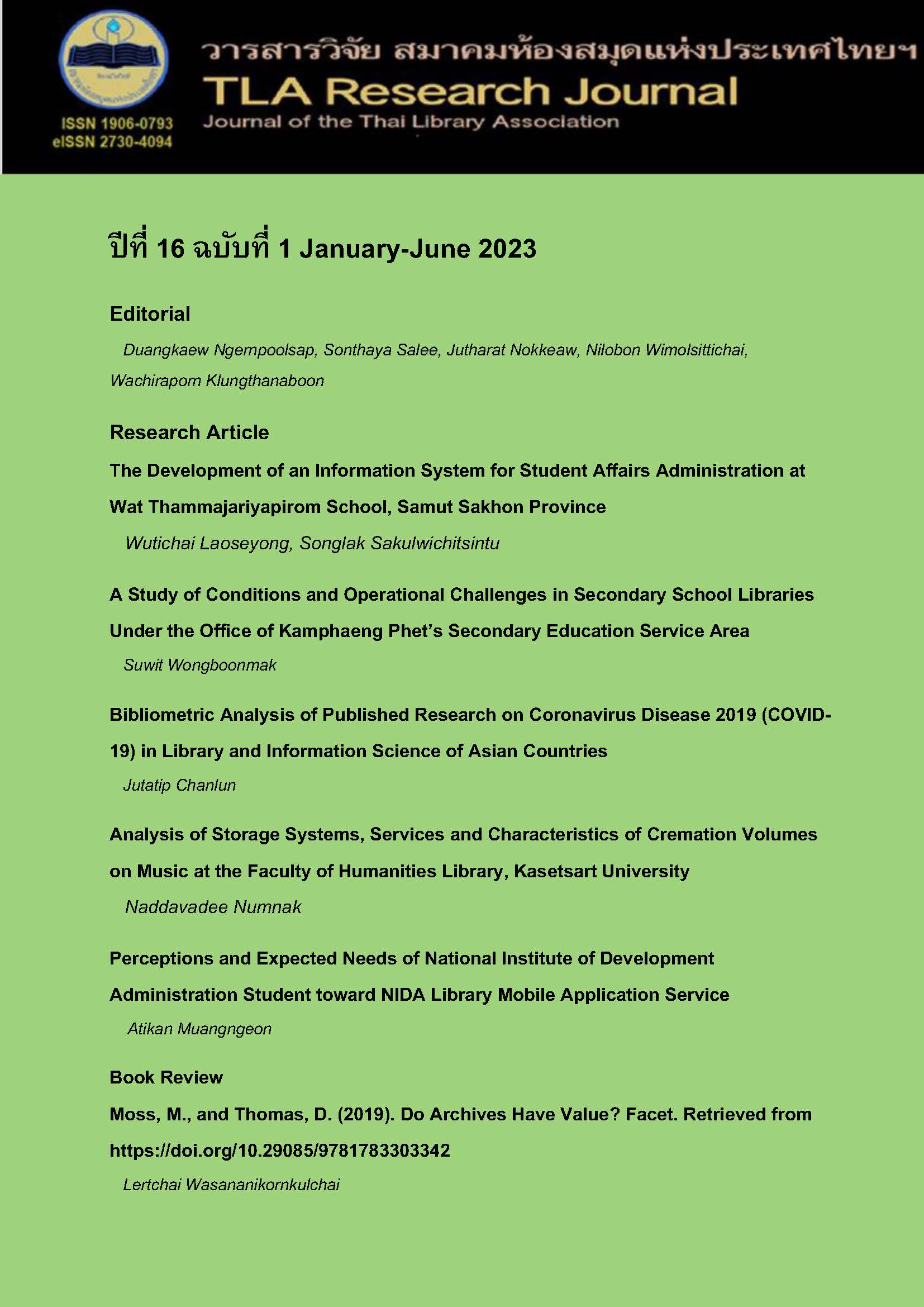Perceptions and Expected Needs of National Institute of Development Administration Student toward NIDA Library Mobile Application Service
Main Article Content
Abstract
This article aims to accomplish the following objectives: 1) To investigate the perceptions and anticipated requirements of students from the National Institute of Development Administration (NIDA) regarding the NIDA Library Mobile Application Service, known as the NIDA Library App; 2) To encourage student utilization of the NIDA Library App for educational and research purposes; and 3) To propose comprehensive guidelines for the development and enhancement of the NIDA Library App services. The research collected data through online questionnaires administered to 371 participants between October 1, 2022, and October 30, 2022, utilizing a stratified random sampling approach. The collected data were subjected to statistical analysis employing methods such as frequencies, percentages, means, standard deviations, t-tests, and one-way analysis of variance. The findings indicated that the overall perceptions of the NIDA Library App in terms of information retrieval services were rated as moderate. Library news and public relations were perceived at a low level, while the circulation service received a similarly low rating. On the other hand, the NIDA Library App's ability to promote and support learning, as well as its adoption, garnered a high level of satisfaction among participants. To further encourage student usage of the NIDA Library App, it is recommended that NIDA undertake promotional initiatives such as infographics, video tutorials illustrating the app's usage, and orientation sessions for new students and staff. The research outcomes hold significant value as they provide practical guidelines for the development and improvement of the NIDA Library App services, thereby enhancing the overall user experience.
Article Details

This work is licensed under a Creative Commons Attribution-NonCommercial-NoDerivatives 4.0 International License.
บทความทุกเรื่องที่ลงตีพิมพ์จะได้รับการตรวจอ่านโดยผู้ทรงคุณวุฒิ ความคิดเห็นและบทความที่ปรากฏในวารสารนี้ เป็นของผู้เขียนซึ่งมิใช่เป็นความคิดเห็นของคณะผู้จัดทำ และมิใช่ความรับผิดชอบของสมาคมห้องสมุดแห่งประเทศไทยฯ การนำบทความในวารสารนี้ไปตีพิมพ์ซ้ำต้องได้รับอนุญาตจากคณะผู้จัดทำ
All articles submitted for publication will be reviewed by the academic reviewers. The editorial board and TLA claim no responsibility for the content or opinions expressed by the authors of individual articles or columns in this journal. Reprinting of any articles in this journal must be permitted by the editorial board.
References
Benjarongkij, Y. (1999). Audience Analysis. Bangkok: Faculty of Communication Arts, Chulalongkorn University.
Chulalongkorn University. Political Science Library. (2010). Library Beep!. Retrieved from http://www.resource.lib.su.ac.th/Jgroup/images/stories/file/market/market37.pdf
Chang, C.-C. (2013). Library mobile applications in university libraries. Library Hi Tech, 31(3), 478-492.
Kaewnium, K. et al. (2014). Book Hunter: The Book Hunter: Mobile application for identifying the location of library information resources. PULINET Journal, 1(1), 55-60. [In Thai]
Kradart, T. (2019). Study of Behavior and Guidelines in Using Cloud Social Media and Mobile Applications for Public Relations of King Mongkut's University of Technology North Bangkok (Research report). Bangkok: Institute of Computer and Information Technology, King Mongkut's University of Technology North Bangkok.
Mikhanmak. J. et al. (2021). Factors Influencing Acceptance to Use of PAOTANG Application. In The 6th CRU-National Conference in Science and Technology: NCST 6th 2023. (pp. 103-108). May 22, 2021. Bangkok: Faculty of Science, Chandrakasem Rajabhat University.
National Library of Thailand. (2022). NLT Smart Library. Retrieved from https://www.nlt.go.th/library/164-NLT-Smart-Library
Nonthachai, I. and Kwiecien, K. (2013). A Development of M-Library Services for The Center for Library Resources and Educational Media, Suranaree University of Technology. Journal of Information Science, 31(3), 30-48. [In Thai]
Oncoksung, C. (1975). Educational Psychology. Bangkok: Textbook production project Srinakharinwirot University.
Phalachaipiromsil, S. (2010). Usages Trend of Mobile Application. Executive Journal, 31(4), 110-111. [In Thai]
Phengphao, N. (2018). Internet Banking Using Behavior Bangkok Bank ‘BUALUANG MBANKING’ Application User (Master's thesis). Ramkhamhaeng University, Bangkok, Thailand. [In Thai]
Pithiwatchotikul, N. (2015). Mobile Technology Acceptance, Social Media Marketing, and Online Consumer Behavior Affecting Online Products’ Purchase Intention through Application of Customers in Bangkok (Master's independent study). Bangkok University, Bangkok, Thailand. [In Thai]
Sangchantr, R. (2018). Perceptions and Expectation of Chulalongkorn University Student toward CU Library Mobile Service. PULINET Journal, 5(2), 55-64. [In Thai]
Sangkaeo, M. (2013). MUT Student Personal App (Master's independent study). Mahanakorn University of Technology, Bangkok.
Silpcharu, T. (2006). Research and Statistical Analysis with SPSS (5th ed.). Bangkok: V. Inter Print.
Sridam, I. (2021). Application of Information Technology to Mobile Phone for the Development of Learners. Journal of Innovative Technology Management Rajabhat Maha Sarakham University, Faculty of Information Technology, Rajabhat Mahasarakham University, 5(2), 60-70. [In Thai]
Surasonthi, K. (2544). Communication Knowledge. Bangkok: Chuan Phim Thammasat.
Techataweewan, W. (2017). The Conditions and Needs Assessment in Mobile Technology Usage for Academic Library Services in Thailand. Bangkok: Faculty of Humanities, Srinakharinwirot University.
Thipprapai, N. (2015). The Satisfaction and Behavior among Company Workers to use Application Affecting Rebooking Hotel by Application on Smartphone (Master's independent study). Bangkok University, Bangkok, Thailand. [In Thai]
Thomas, L. C. (2012). The State of mobile in libraries 2012. Retrieved from http://www.thedigitalshift.com/2012/02/ mobile/the-state-of-mobile-in-libraries-2012/
Wonganutrohd, P. (2004). Personnel Management Psychology. Bangkok: Bangkok Promotion Center.
Wongchalee, S. and Suwannapak, S. (2012). M-Library. Journal of Library and Information Science Srinakharinwirot University, 5(2), 121-147. [In Thai]


